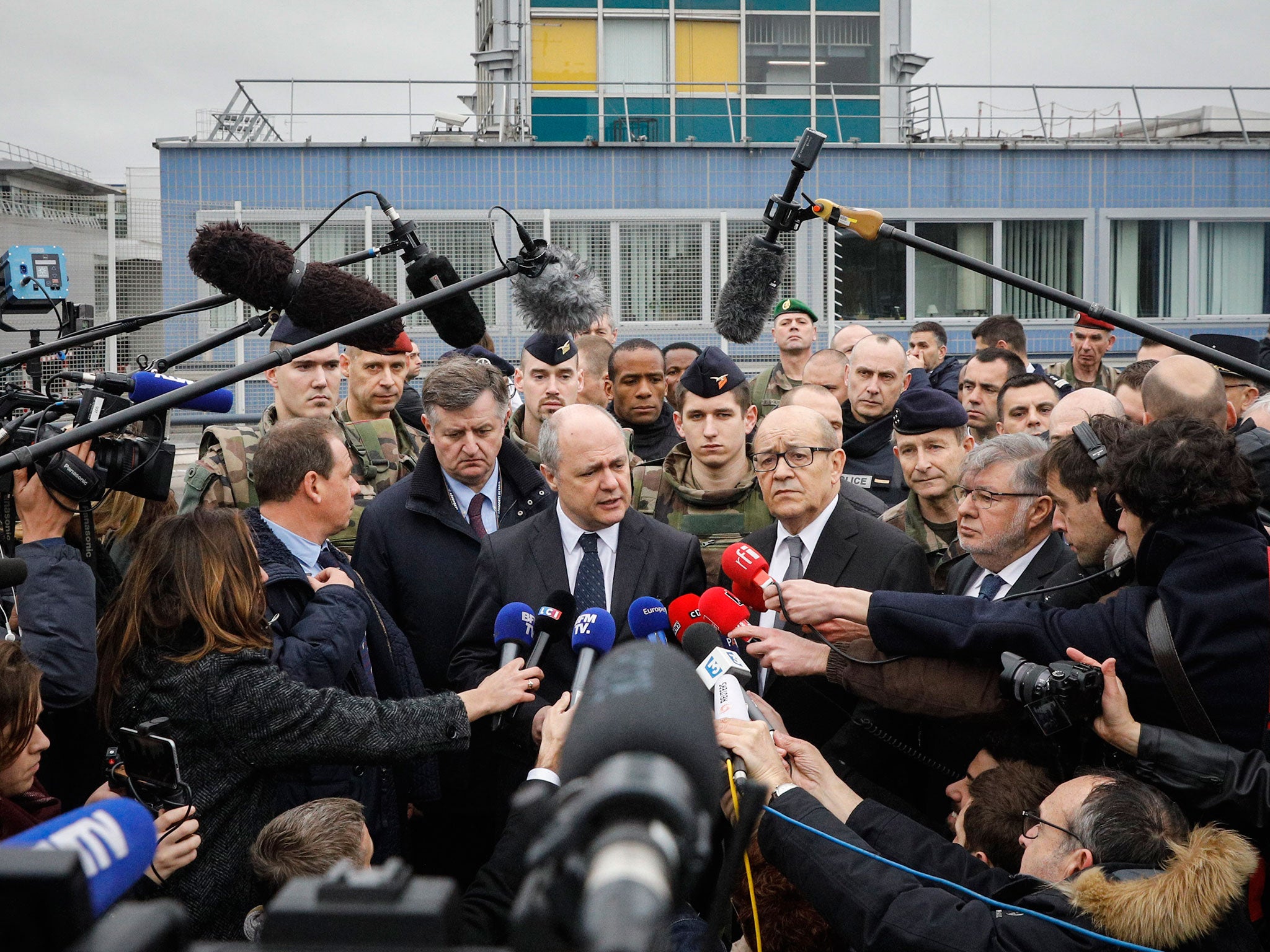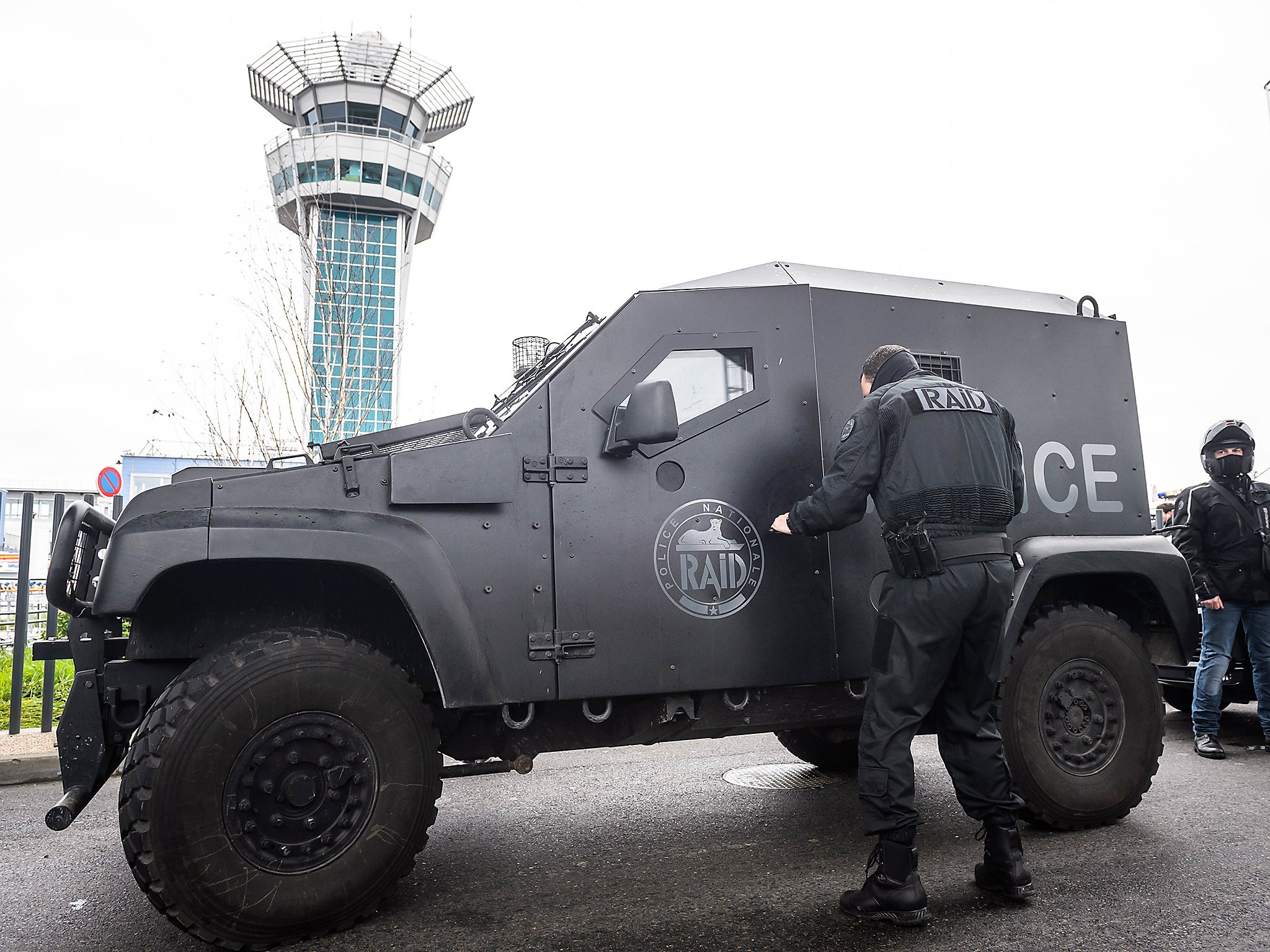Paris Orly Airport shooting: Another failure for French security forces could have consequences for election
Intelligence services probing how man previously investigated for extremism slipped through net

Your support helps us to tell the story
From reproductive rights to climate change to Big Tech, The Independent is on the ground when the story is developing. Whether it's investigating the financials of Elon Musk's pro-Trump PAC or producing our latest documentary, 'The A Word', which shines a light on the American women fighting for reproductive rights, we know how important it is to parse out the facts from the messaging.
At such a critical moment in US history, we need reporters on the ground. Your donation allows us to keep sending journalists to speak to both sides of the story.
The Independent is trusted by Americans across the entire political spectrum. And unlike many other quality news outlets, we choose not to lock Americans out of our reporting and analysis with paywalls. We believe quality journalism should be available to everyone, paid for by those who can afford it.
Your support makes all the difference.Francois Hollande is hailing the bravery of security forces, terrorism prosecutors are investigating the suspect’s motives and French intelligence services are probing how they yet again let an extremist slip through the net.
The cycle following the attempted attack at Paris Orly Airport feels grimly familiar in France, where more than 230 people have been killed in a wave of terrorist atrocities starting in January 2015.
But with a presidential election fast approaching, the political stakes are even higher for Mr Hollande’s government as it seeks to bolster support among the French public and stem the rise of the far-right.
Marine Le Pen, the Front National’s leader, was quick to capitalise on Saturday’s events, which saw suspected Islamist Ziyed Ben Belgacem shoot a police officer at a checkpoint before being killed while attempting to seize a soldier’s gun at the airport.
“I want the state to take charge of ensuring safety for the French,” she told supporters at a campaign rally in Metz.
“The French will not be protected by people who refuse to face up to reality.”
Ms Le Pen, currently polling in second place for next month’s presidential election, claimed France was “overrun with violence” as a result of “lax” governments.
Her main opponent, the centre-left former economy minister Emmanuel Macron, pledged to restore military service at his own campaign event.
Time will tell whether the latest attack to rock France will sway voters going to the polls in April.
A succession of terrorist atrocities has undermined trust in the current government, which has repeatedly vowed to carry out wide-ranging security reforms after failing to prevent Isis-inspired attacks in Nice, Normandy, Magnanville and elsewhere.
A state of emergency giving security services dramatically increased powers to search, detain and monitor suspects was brought in after Isis militants massacred 130 people in the November 2015 Paris attacks.
The interior minister said Saturday’s shooting justified the measures, which have raised human rights concerns at the United Nations, but the incident will be seen as another failure by the French intelligence agencies.
Belgacem injured only one police officer during his rampage, with a potential massacre at Paris Orly Airport averted by the quick reactions of patrolling air force soldiers who opened fire as he tried to seize an assault rifle from their colleague.
But what ministers hailed as a victory for the security services appeared to come by chance rather than design.
Belgacem, a 39-year-old Frenchman, had a lengthy criminal history of violence, robbery and drug offences but was not on the “fiche S” list of terror threats, despite being investigated by the DGSI as a potential jihadi after indications of Islamist radicalisation emerged in 2015.
Research has shown that more than half of European Isis fighters have a criminal past, with recruiters deliberately targeting violent criminals and gang members looking for redemption and a licence to kill in the name of jihad.
One of the most prominent examples is the network that carried out both the Paris and Brussels attacks.
Co-ordinator Abdelhamid Abaaoud, bomber Ibrahim Abdeslam and his brother Salah were all involved in crime in the Brussels suburb of Molenbeek, while Paris supermarket gunman Amedy Coulibaly had served time for receiving stolen goods, drug trafficking and robbery.
Like many other Islamists, Belgacem is believed to have been radicalised in prison and was put under surveillance after being freed, although it was unclear when monitoring was stopped.

Prosecutors said no evidence of extremism was uncovered in a search of his home, which was among scores raided in the immediate aftermath of the Paris attacks.
Belgacem’s first attack came at 6.50am (5.50am GMT) on Saturday morning, when he was stopped for speeding by a police patrol in the northern Paris suburb of Garges-les-Gonesse.
The national police information office said he was showing officers identification papers when he pulled put a pellet gun and opened fire, hitting one police officer in the face.
“I screwed up, I shot the police," read a text sent to relatives according to French broadcaster BFMTV.
They fired back but Belgacem managed to flee in a Renault Clio, which he dumped to hijack a woman’s Citroen Picasso after making threats in a bar in Vitry.
The stolen vehicle was later found at Paris Orly Airport – but not until Belgacem had been shot dead in the attempted attack.
Mr Hollande said investigators would determine whether he “had a terrorist plot behind him” and no group has claimed responsibility, with Belgacem’s motives and target remaining unclear.

The President also ruled out any link with the upcoming French presidential election in April and May, noting that France has been battling the threat of extremism for several years.
“Extreme vigilance is underway because we have been attacked and we know what the consequences can be,” Mr Hollande added.
“It is precisely my duty to provide the protection I owe to the French people.”
Isis has directed its followers to carry out opportunistic attacks on security forces and civilians in Europe, presenting a unique challenge for intelligence services adapting to unpredictable patterns of attack.
The Prime Minister, Bernard Cazeneuve, said the Paris public prosecutor’s office would determine Belgacem’s motivations and background.
“All measures put in place to deal with violent actions on our soil have been activated, involving all security and rescue forces as well as transport operators,” he added, saying security and intelligence chiefs had gathered at the interior ministry to “take stock of the situation”.
Jean-Yves Le Drian, the French defence minister, hailed the professionalism and “sang froid” of the troops that shot Belgacem dead.
They had been patrolling as part of Operation Sentinel, a 7,500-strong force deployed around high profile sites including the Eiffel Tower since the Charlie Hebdo massacre.
But Saturday was the fourth time the mission’s troops have themselves been attacked while attempting to protect and reassure the French public and tourists.
Join our commenting forum
Join thought-provoking conversations, follow other Independent readers and see their replies
Comments